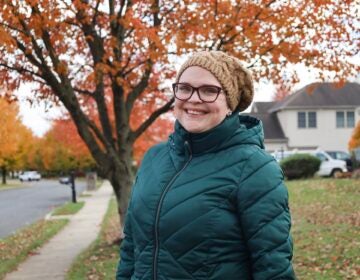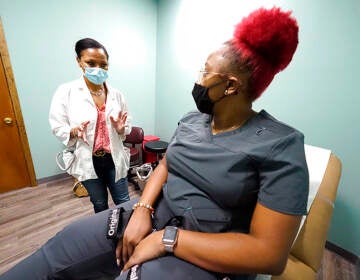Menopause can start younger than you think: Here’s what you need to know

Think you're too young for menopause? Women in their 30s can enter perimenopause, the process leading up to menopause. Here's what you need to know about it. (Katherine Streeter for NPR)
Sarah Edrie says she was about 33 when she started to occasionally get a sudden, hot, prickly feeling that radiated into her neck and face, leaving her flushed and breathless. “Sometimes I would sweat. And my heart would race,” she says. The sensations subsided in a few moments and seemed to meet the criteria for a panic attack. But Edrie, who has no personal or family history of anxiety, was baffled.
She told her doctor and her gynecologist about the episodes, along with a few other health concerns she was starting to notice: Her menstrual cycle was becoming irregular, she had trouble falling asleep and staying asleep, and she was getting night sweats. Their response: a shrug.
It wasn’t until Edrie went to a fertility clinic at age 39 because she and her partner were having trouble conceiving that she got answers. “They were like, ‘Oh, those are hot flashes. It’s because you’re in perimenopause,’ ” she says.
If you haven’t heard the term “perimenopause,” you’re not alone. Often when women talk about going through menopause, what they’re really talking about is perimenopause, a transitional stage during which the body is preparing to stop ovulating, says Dr. Jennifer Payne, who directs the Women’s Mood Disorders Center at Johns Hopkins University.
“Technically, menopause is only one day in a woman’s life, which is exactly when she has not had a period for 12 months,” she says. “It’s the period of time leading up to menopause that causes all the trouble.”
And it can start earlier than you might think. Many listeners wrote to us in response to our call-out for individual experiences with menopause to say that they struggled to get medical support for perimenopause in their mid-30s and early 40s.
When Edrie went back to her OB/GYN with the fertility clinic’s conclusion, she says the doctor shrugged again and told her that menopause is a normal part of life. She wasn’t satisfied with that answer. “Yeah, it’s a normal part of life, but it would be great if we could talk about it and figure out strategies.”
With that spirit in mind, we reached out to endocrinologists, gynecologists and psychiatrists for advice about navigating this major life transition.
How early can perimenopause start?
It’s quite possible for women to start to notice things changing in their mid-30s. Most women arrive at menopause between the ages of 45 and 55, but perimenopause can start as much as a decade beforehand. And about 1% of women in the U.S. reach menopause at age 40 or younger.
How do you know if you’re starting perimenopause?
The most telling symptom is changes in your menstrual cycle, says psychiatrist Hadine Joffe, the executive director of the Connors Center for Women’s Health and Gender Biology at the Brigham and Women’s Hospital in Boston.
“It’s the menstrual cycle pattern that really defines this lead-up to menopause,” she says. During perimenopause, periods “might be shorter, then a long one, or then a skipped one, or then the flow might be different,” says Joffe.
There’s no blood or hormone test that can “diagnose” perimenopause. Joffe says a hormone test isn’t helpful because hormonal cycles become erratic and unpredictable during this stage.
“There’s not really one point in time when a hormone test is done that can be definitive,” she says. Even if you took several tests over time, “you might get a very different readout.”
Surprisingly, sometimes doctors aren’t prepared to help women recognize the start of this life phase. Edrie was upset at her doctors’ responses — or lack thereof. “I felt so disappointed in the medical industry. How many women has my OB/GYN seen and not recognized the symptoms of perimenopause?”
What symptoms to expect
Be prepared for your PMS symptoms to possibly shift, becoming either more or less extreme, says Dr. Cynthia Stuenkel, a founding member of the North American Menopause Society and a professor and endocrinologist at the University of California, San Diego, School of Medicine. “Women might not get the same kind of breast tenderness or mood shifts that they may have noted in the past,” she says.
Mood problems like depression can spike during perimenopause, especially among women who have previously experienced them. Many of our listeners wrote in to say that during perimenopause, they felt incredibly irritable and quick to anger in a way that they had never experienced before.
And of course, many — but not all — women experience hot flashes, though they may not recognize them. “It’s hard, because no one sits us down and teaches us, ‘Here’s what a hot flash feels like,’ ” Stuenkel says. “I’ve seen women who think they’re having panic attacks, or heart palpitations. That can be frightening.”
Other common symptoms include more frequent urinary tract infections, difficulty sleeping through the night, vaginal dryness that can make sex painful, night sweats and a decrease in libido.
What treatments are there for symptoms?
Some symptoms, like heavy or irregular periods, can be managed with an oral contraceptive, which can “shut down the body’s own erratic hormonal fluctuations,” says Stuenkel.
“This can kind of be a lifesaver,” she says. Such medication may help with hot flashes, too.
In some cases, doctors may prescribe menopausal hormone therapy, or very low doses of hormones to supplement estrogen levels. Stuenkel says it’s not a fit for everyone, but it doesn’t deserve the bad reputation it has in some circles. She says there was an “exodus” from the use of hormone replacement therapy after the Women’s Health Initiative trial halted a study over safety concerns in 2002. But many clinicians now feel much more comfortable using hormone therapy again and usually recommend low doses, selectively, for shorter periods of time.
For people who cannot take estrogen therapy, or choose not to, Stuenkel says some drugs in the antidepressant family, such as SSRIs and SNRIs, can help with hot flashes. Stuenkel says, “While they’re not perfect, they can take the edge off and help enough so that women can get a better night’s sleep.”
There are an abundance of nonhormonal, nondrug treatment options for managing symptoms, some of which have significantly more evidence backing them than others. In 2015, a North American Menopause Society panel found that cognitive behavioral therapy and hypnosis were significantly effective in treating hot flashes. The same panel also found that popular herbal remedies (like black cohosh, dong quai and evening primrose) are “unlikely to help,” although some NPR listeners who wrote in said they got relief from some of those treatments.
For depressive and anxiety symptoms, women may want to seek out professional counseling or a psychiatrist.
When do I need to see a doctor?
You might not need to at all. Some people sail right through menopause with little trouble. But if you are experiencing symptoms that are interfering with your life, it’s worth making an appointment. Some of these symptoms could indicate other problems that need treatment, such as fibroids or even cancer.
Ways to cope with symptoms
For people approaching this stage of life or who are already going through it, here are four steps for making this transition more manageable.
1. Get educated
“Information is key,” says Joffe. She suggests that people approaching perimenopause age empower themselves with knowledge.
The Massachusetts General Hospital Blum Center has a curated list of suggested books. The National Women’s Health Information Center has a section on menopause and perimenopause. The American College of Obstetricians and Gynecologists also has a perimenopause FAQ.
2. Monitor your health
Joffe encourages people to track symptoms: “menstrual patterns, hot flash patterns, mood issues, major life triggers.” Using a paper calendar or an app to monitor symptoms can make it easier to give your doctor details that can be otherwise hard to remember.
“Knowing that information, somebody can say, ‘Well, over the last six months, I only had two periods or I had hot flashes almost every day,’ ” Joffe says, “or, ‘My mood was as bad as it gets for only two days or for a third of the time.’ ”
And if you bring a thorough health history to your physician and they still give you a shrug, consider a specialist. “There are OB/GYNs that specialize in perimenopause and menopause,” Joffe says.
3. Practice smart self-care
Joffe encourages women to protect themselves from things that might worsen their mood or well-being. This includes reducing stress when they can and making sure they get enough sleep.
“Sleep is critical,” she says. “Getting a good night’s sleep, and making sure it’s not broken in the middle of the night.”
There are lots of online tools and apps to help with sleep, she adds.
And familiar health advice like getting enough exercise, eating well and moderating alcohol consumption apply to perimenopause too, says Dr. Steven Goldstein who is the co-author of Could It Be … Perimenopause? and a professor of obstetrics and gynecology at the New York University School of Medicine.
At her doctor’s suggestion, Edrie developed a mindfulness practice. She says, “I thought it sounded a little ‘woo-woo’ at first, but being able to pay attention to what my body is doing and why helps me separate those symptoms from what I need to get through my day. So I’m not overwhelmed by what my body is putting me through.”
4. Cultivate community
Most of the women who wrote to NPR about their experiences going through perimenopause said that they felt alone and isolated during this transition.
Having a community to talk to can make it easier to cope with the changes, says Payne, who’s going through perimenopause herself. She says she has found support from a few close friends from college.
“To be able to reach out to a group of women who are our same age and say, ‘Did you go through this? And, you know, it does provide support. I think that’s another version of a coping skill,” she says.
Edrie says she joined a few Facebook groups dedicated to perimenopause and found one in particular where she got tips on coping with one of her most troublesome symptoms: brain fog. The conversations made her feel understood and validated.
“I can post about it in this group, and, you know, 10 women will be like, ‘Oh, last week, that totally happened to me,’ or like, ‘I forgot my kid’s computer on the top of my car and drove away,’ ” she says.
She says that being able to commiserate helps her get through symptoms “that maybe don’t have a magic pill.” Some of her online friendships have even taken shape offline. Edrie has met up with some of the Facebook group members while touring the country with her band.
Now she’s a big proponent of finding community and speaking out. “As we get older, we get more and more quiet about what’s going on with our bodies and ourselves and our lives. We kind of just, buck up and deal with it.”
“And I feel like if we talked more about the things that are happening to our bodies — even if we can’t actually do anything about some of these things — it would just be better for society in general if we were more vocal about it.”
9(MDAzMzI1ODY3MDEyMzkzOTE3NjIxNDg3MQ001))




